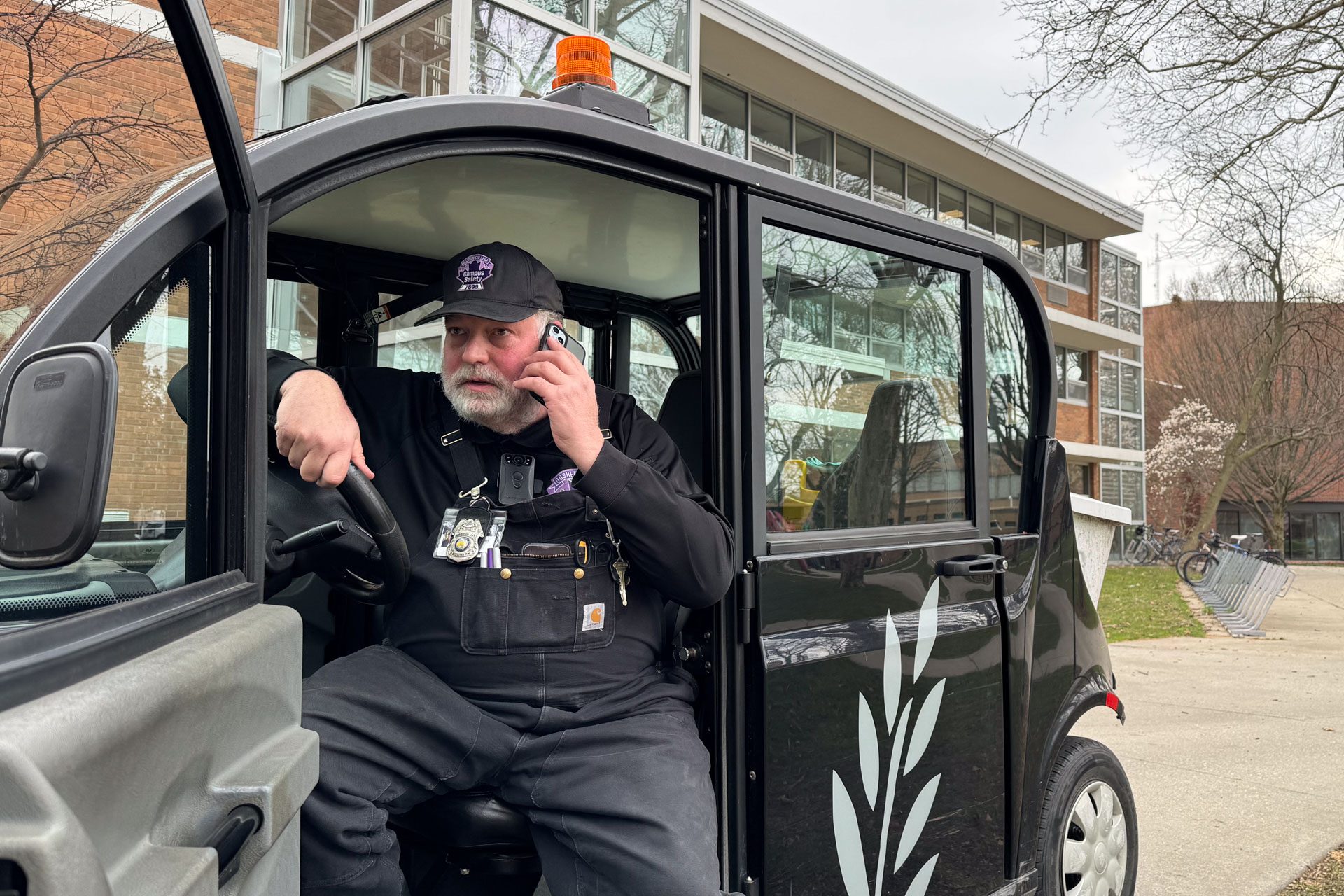I met Doug Crum at the campus safety desk at 11:56 p.m. on Saturday night. He was clocking in for an eight-hour shift, and was taking me along for the ride.
Zeke Kingsbury was the safety office on duty that evening, so he gave Crum the rundown from his shift earlier that evening:“Not much to report,” he said. “Goshen Health called, they had reports of someone acting strange in their parking lot, black hoodie, red hat. They said he was headed our way but I never saw him.”
As Crum settled into his shift, he turned to me. Crum came prepared with printouts of news articles of tragedies from other universities that serve as reminders for Crum for why he does what he does. Additionally, he had the campus safety mission statement, and a message from Dakota Blaise, another safety officer.
Blaise is the son of Kris Polega (also a safety officer), and is transgender. When he heard I was coming to shadow Crum, he wanted to make sure to make it clear that he is a resource for GC students who might be struggling with their own gender identity.
Kingsbury overheard the conversation and wandered over. “I might as well throw my hat in the ring,” he said. Kingsbury is aromantic and asexual, and also wants to be a resource for GC students who might be struggling with their sexual orientation.
As we began the shift, Crum showed me the banks of security cameras and the software for the door card-readers (GC students are decently active at 12:30 a.m. on the weekend). With that under our belt, it was time to head out.
Armed with my notebook and a borrowed flashlight (and feeling like the quintessential reporter), I followed Crum as we headed out. We loaded into the safety golf cart and started driving, keeping an eye (and ear) out for anything that looked odd.
“We have to use all of our five senses,” Crum told me. “Does anything look out of place, smell weird, any weird sounds?”
Any anomaly that is found during a shift is documented with a photo and goes into the shift report. Additionally, any interaction with a student gets written up.
According to Crum, a 20-minute interaction can equal up to three hours of paperwork.
As we drove, Crum kept an ear on his phone, which was playing a live feed of the local police scanner. He does it in order to be aware of any activity that might be happening on the fringe of campus. With 39 years of experience as a first responder and 10 years as a police dispatcher, he’s well aware of the inner workings of police and fire departments.
According to Crum, the only thing that puts him on edge during his shift is meeting someone unexpectedly.
“The first thing I say to someone I encounter is ‘Hi, hello, are you okay?’” Crum told me. “The second question is ‘Are you in any way affiliated with the college?’”
After a couple of hours of buildings and parking lots, it was time to sweep the Rec-Fit Center. Up until this point, I hadn’t been too freaked out. I’ve worked the night shift in a factory, so the dark wasn’t too bad, but the RFC has lots of unsettling spaces, and Crum wasn’t putting me at ease.
“Are you prepared if you see a dead body?” he asked me as we entered the public locker room. “It’s very common to die on the toilet.”
After I admitted that, no, in fact I was not at all prepared, he told me how his career as a first responder has framed his thinking.
“I am always prepared emotionally,” he said.
As the night started to come to a close, we drove past the north end of Kratz dorm.
“See anything that looks odd?”
I did, actually: I was pretty sure the door to the first floor was propped open, and upon further investigation it was. This meant that there was no locked door between the sleeping residents of Kratz One and the outside world.
As we quickly remedied that, suddenly a car alarm started blaring. Across the tracks, three cars sat parked next to each other in an otherwise empty lot. No lights were on except for the middle car, which was now blasting its horn and flashing its lights.
Crum and I headed towards it, the golf cart “lit up like a Christmas tree.” As we got closer I could feel my heart pounding — were we about to have an interaction with someone? Was someone in trouble?
From a distance we scanned under the cars with our flashlights, and then slowly made our way in and checked the interior of each car.
The cars were empty, and the alarm eventually stopped. It was nearly 7 a.m, the sun was coming up and it was almost time for Crum to start unlocking buildings.
In the end, it was a relatively uneventful night, but it was clear how much intentional effort goes into keeping campus safe each night. And Crum made it clear: with safety in mind, they aren’t just in the office waiting for calls, they’re out being proactive and observant.
By Crum’s own admission, some have rolled their eyes at how seriously he takes his safety officer responsibilities, but he has an answer to those that question him.
“Change my title to security guard then, because you can’t expect me to walk past something that every bone in my body tells me is wrong and not do something.”
Author’s note: At the end of the shift, the author found himself locked out of his house, and Crum had to let him in. While there, Crum did a routine check on the fire extinguisher and found a half-empty bottle of vodka belonging to the author, leading to a community standards violation. The author hoped that he had built up enough rapport with Crum over the previous seven hours for Crum to look the other way, but he is a man of integrity. It seems the author, on the other hand, is not.




